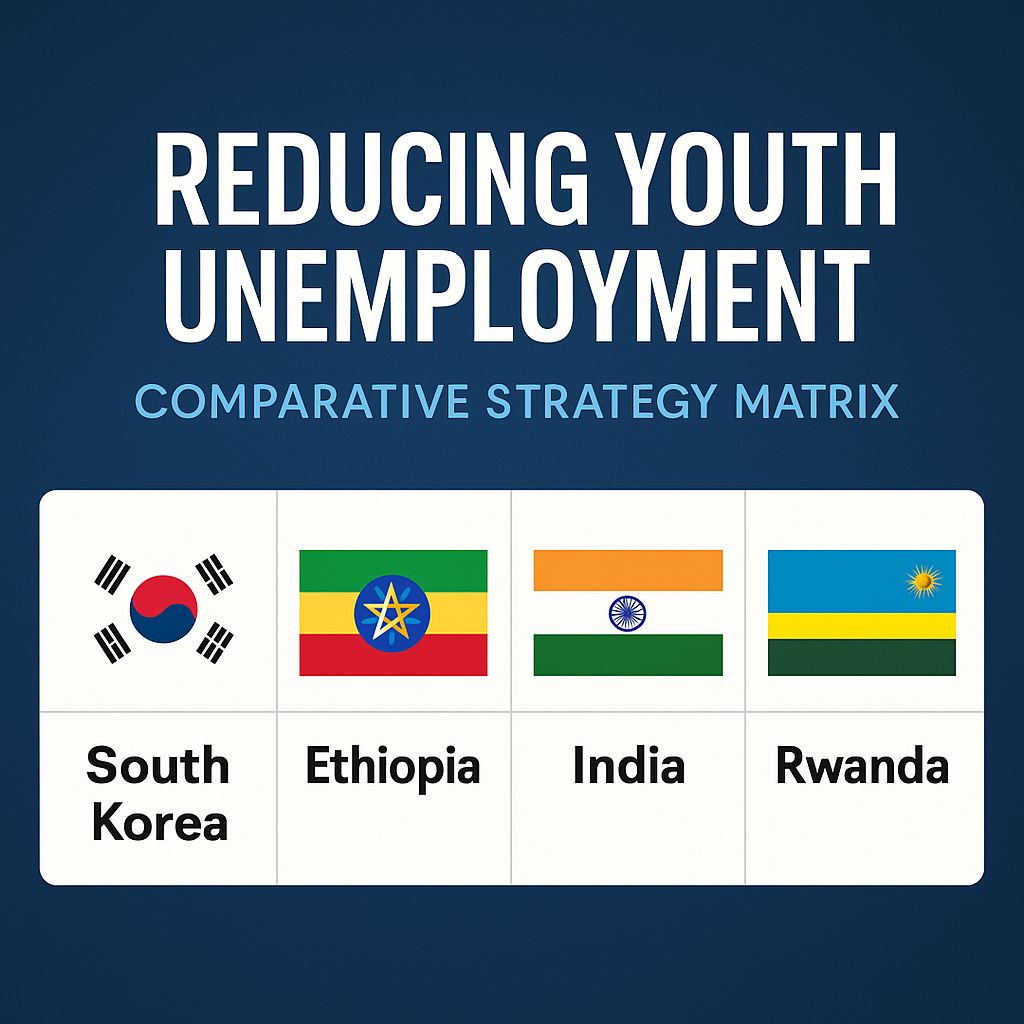Table of Contents

Good morning, let’s get into today’s article
So this is one of my “I asked ChatGPT” questions, to be honest, I put it as one of my research tools apart from Google, interviews and sometimes Reddit. And it’s quite handy, but anyways;
I wanted to know if reducing unemployment among us the youth is really possible. It seems like an impossible task or maybe it isn’t because other countries have done it, although to varying degrees. What if we try to reduce it to 8%, let’s find out how that can be done and how some countries have managed to do that.
How to reduce youth unemployment

Gif by IntoAction on Giphy
Reducing youth unemployment in Botswana from over 40% to 8% in 5 years would require a bold, coordinated, and data-driven national strategy. Here’s a realistic and focused multi-pillar plan I would implement if tasked with leading this mission:
🎯 Target: Bring youth unemployment (ages 15–35) from ~44% to ≤8% by 2030
1. Mass Skills Transformation Program (MSTP)
Goal: Make 250,000 young Batswana employable in high-demand sectors.
Action Steps:
Launch free national upskilling programs in partnership with Google, Microsoft, and local universities focused on:
Digital skills (AI, data, coding, cybersecurity)
Construction & infrastructure
Tourism and hospitality
Green energy and agriculture tech
Provide job guarantees or paid internships post-training (with corporate incentives for hiring).
Tie to Botswana Qualifications Authority (BQA) for recognized micro-certifications.
2. SME and Startup Jobs Engine
Goal: Support 50,000 youth-led businesses that each employ 2–10 peers.
Action Steps:
Launch a P500 million Youth Entrepreneurship Fund (public-private pooled capital).
Create startup zones in Gaborone, Francistown, and Maun with free co-working spaces, electricity, and high-speed internet.
Give tax holidays (3–5 years) for youth-led businesses hiring fellow youth.
Connect startups to export markets, especially in SADC.
3. Rural-Urban Infrastructure Jobs Corps
Goal: Directly employ 100,000 youth in infrastructure projects.
Action Steps:
Expand government investment in rural roads, water systems, smart agriculture, and clean energy.
Use a National Youth Infrastructure Corps model where unemployed youth are recruited, trained, and paid monthly stipends to participate.
Tie this to local procurement laws that require 30% youth labor participation in every national project.
4. Private Sector Youth Quota & Internship Mandate
Goal: Force acceleration of youth hiring in private enterprises.
Action Steps:
Pass legislation mandating 10% of all formal sector jobs to be reserved for youth (with quarterly audits).
Offer tax credits to companies that maintain high youth hiring ratios.
Make internships mandatory in all university and college curricula and fund 50,000 paid internships annually through a National Internship Stipend Scheme.
5. Digital and Freelance Export Acceleration
Goal: Turn 50,000 young Batswana into global digital workers.
Action Steps:
Partner with Upwork, Fiverr, and Deel to create a “Botswana Freelance Passport”: verified identity, tax info, and work history.
Invest in rural internet hubs and train youth in freelancing, digital marketing, graphic design, etc.
Launch a “Digital Batswana Export” campaign—position Botswana as Africa’s emerging talent hub.
Cross-cutting Enablers:
Data and Accountability: Launch a real-time Youth Employment Tracker Dashboard.
Education Reform: Mandate entrepreneurship, financial literacy, and tech in junior secondary and tertiary curriculums.
Public-Private Task Force: Monthly progress reviews with stakeholders including youth leaders, banks, corporates, and government.
📉 Expected Impact by 2030:
Metric | 2025 | Target (2030) |
|---|---|---|
Youth Unemployment | ~44% | ≤8% |
Youth SMEs Funded | ~2,000 | ≥50,000 |
Youth in Infrastructure Corps | 0 | 100,000 |
Freelancers earning foreign currency | ~1,000 | 50,000 |
Countries that have achieved reducing youth unemployment

Gif by MovementMemes on Giphy
While no country has achieved exactly a drop from 40 %+ youth unemployment to under 8% in five years, several countries have successfully executed programs that drastically reduced youth unemployment or created massive youth employment opportunities within 3–7 years through deliberate policy action.
Here are five examples, each relevant to Botswana's context in different ways:
🇰🇷 South Korea – Tech Upskilling & SME Support
Timeframe: 1998–2005
Strategy: After the Asian Financial Crisis, South Korea launched:
Massive investment in youth tech training and innovation hubs (e.g., KAIT).
Incentives for hiring youth in SMEs and tech startups.
A culture of freelancing and remote work began emerging.
Result: Youth employment rebounded, and Korea became a tech and innovation powerhouse with a thriving young entrepreneur class.
🇪🇹 Ethiopia – Urban Youth Jobs Program (2011–2016)
Strategy: The government, with World Bank support, launched:
Massive investment in skills for urban youth.
Employment-intensive infrastructure projects.
Micro-loans and training for small businesses.
Result: Created over 200,000 jobs, particularly in construction, light manufacturing, and services. Youth self-employment and informal work rose, pulling unemployment down.
🇮🇳 India – Digital India & Skill India Missions
Timeframe: 2015–2020
Strategy:
Built 500+ rural digital skill centers (under PMKVY).
Massive freelance workforce development (Upwork, Fiverr, Toptal partnerships).
Encouraged youth to join the global digital economy.
Result: India became the world’s largest freelance market, with millions of youth generating income online — many from low-income or rural backgrounds.
🇷🇼 Rwanda – National Youth Entrepreneurship Program
Timeframe: 2015–2022
Strategy:
Created youth business incubators and financing schemes.
Established youth employment quotas in national tenders.
Mandatory TVET education integration at all levels.
Result: Thousands of youth businesses launched, and the unemployment rate for youth dropped steadily, with improved self-employment and formal sector absorption.
🇪🇸 Spain – Youth Employment Emergency Plan (2019–2021)
Strategy:
€2 billion investment into youth hiring subsidies.
Internship and apprenticeship mandates in all tertiary institutions.
Focused on green economy and digital transformation jobs.
Result: Youth unemployment dropped from 40% to under 30% in three years (pre-COVID), especially for under-25s.
🔍 Lessons for Botswana:
No magic bullet—combining skills, SME support, job creation, and global access is essential.
Targeted, well-funded programs work, especially when paired with real-time data tracking and private sector incentives.
Botswana’s small population (~2.5M) gives it an advantage: change can happen faster with proper alignment.
Comparative Matrix for Botswana

Gif by thedailyshow on Giphy
Here’s a comparative matrix showing how Botswana can adapt successful strategies from other countries that tackled youth unemployment, and what it would look like in Botswana’s context:
📊 Comparative Strategy Matrix: Reducing Youth Unemployment
Country | Key Strategy | Outcome | Botswana Application |
|---|---|---|---|
🇰🇷 South Korea | Tech Upskilling + SME Incentives | Youth employment rebounded; strong SME sector | Launch TechX Skills Hubs in each district + give tax breaks to youth-hiring SMEs |
🇪🇹 Ethiopia | Urban Youth Works Programs | 200,000+ jobs created in construction and services | Launch a National Youth Infrastructure Corps to employ youth on local projects |
🇮🇳 India | Digital Freelancing + Rural Skills | India leads in global freelance earnings | Create a Botswana Freelance Passport + free internet hubs for rural youth |
🇷🇼 Rwanda | Youth Enterprise Development + TVET | Self-employment increased; more formal youth jobs | Fund youth-owned startups + mandate entrepreneurship & skills training in schools |
🇪🇸 Spain | Hiring Subsidies + Apprenticeships | Youth unemployment fell ~10% in 3 years | Give youth hiring incentives to companies + make internships mandatory in all tertiary programs |
🧠 Takeaways for Botswana
Area | International Lesson | Botswana Opportunity |
|---|---|---|
Skills Development | Short, targeted programs work better than degrees | Make micro-certifications (3–6 months) free + accredited |
Youth Businesses | Easy access to finance + mentorship is key | Build a Youth Business Acceleration Fund (P500M) |
Infrastructure Jobs | The government can directly create jobs | Tie all major projects to a 30% youth employment clause |
Digital Economy | Freelance work is the fastest-growing youth job sector | Botswana can be Southern Africa’s remote work hub |
Accountability | Transparent, real-time data keeps programs on track | Launch a Youth Jobs Dashboard to track progress publicly |
As you can see, this is highly possible, perhaps we’re not trying hard enough, but it’s possible.

